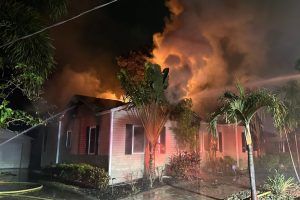
Prioritizing Safety and Immediate Needs
The moments immediately following a house fire are critical. Your primary focus should be on ensuring the safety of yourself and your loved ones. Here’s what you need to do right away:
Evacuate and Seek Medical Attention
If you haven’t already done so, evacuate the premises immediately. Even if the fire appears to be out, there may be hidden dangers lurking. Smoke inhalation and burns can have serious health consequences, so it’s essential to seek medical attention promptly, even if injuries seem minor.
Find Temporary Shelter
Once you’re safe, secure a place to stay. This could be with friends, family, or at a local hotel. If you’re unsure where to go, contact local disaster relief organizations like the American Red Cross or Salvation Army for assistance with temporary housing.
Contact Loved Ones
Reach out to family members and close friends to let them know you’re safe. They can provide emotional support and may be able to offer practical assistance during this difficult time.
Secure Important Documents
If it’s safe to do so and you have permission from fire officials, try to retrieve essential documents such as identification, insurance policies, and financial records. These will be crucial for the recovery process.
Engaging with Emergency Services
Proper coordination with emergency services is vital in the aftermath of a house fire. Here’s how to proceed:
Cooperate with Fire Department Officials
Follow all instructions given by firefighters and other emergency personnel. They will inform you when it’s safe to re-enter your property and provide valuable information about the fire’s cause and extent of damage.
Obtain a Fire Report
Request a copy of the fire report from your local fire department. This document will be essential when filing insurance claims and may contain important details about the incident.
Coordinate with Law Enforcement
If arson is suspected or if your home needs to be secured against potential looting, work with local law enforcement to ensure your property is protected.
Initiating the Insurance Process
Dealing with insurance can be complex, but it’s a crucial step in recovering from a house fire. Here’s how to get started:
Contact Your Insurance Provider and a Public Adjuster
Notify your insurance company as soon as possible after the fire. They will guide you through the claims process and may be able to provide immediate assistance with temporary housing and living expenses. In Florida, you should also contact a public adjuster, like us, to make sure you get the money you deserve back from your insurance company.
Document the Damage
Take extensive photos and videos of the damage to your home and belongings. This visual evidence will be invaluable when filing your claim and assessing losses.
Review Your Policy
Carefully review your insurance policy to understand your coverage, including limits and any exclusions. If you’re unsure about any aspects, don’t hesitate to ask your insurance agent for clarification.
Keep Detailed Records
Maintain a thorough record of all communications with your insurance company, including dates, times, and the names of representatives you speak with. This documentation can help prevent misunderstandings and ensure a smoother claims process.
Securing and Protecting Your Property
Even after the fire is out, your home may be vulnerable to further damage. Take these steps to secure your property:
Board Up Openings
Cover broken windows, doors, and any holes in the structure with plywood or tarps to protect against weather and potential intruders.
Salvage Valuables
If it’s safe and you have permission, remove any undamaged valuables from the property. This may include jewelry, important documents, and sentimental items.
Arrange for Professional Security
Consider hiring a security service to monitor your property, especially if you’re unable to stay there or if valuable items remain inside.
Address Water Damage
If water was used to extinguish the fire, take steps to prevent mold growth and further water damage. This may involve removing standing water and using dehumidifiers to dry out the space.
Assessing the Extent of Damage
A thorough assessment of the damage is crucial for both insurance purposes and planning the restoration process:
Work with Insurance Adjusters
Cooperate fully with insurance adjusters who will visit your property to assess the damage. Their evaluation will play a significant role in determining your claim settlement.
Consult Independent Experts
Consider hiring an independent public adjuster or restoration specialist to provide an unbiased assessment of the damage and potential restoration costs.
Evaluate Structural Integrity
Have a professional engineer or building inspector assess the structural integrity of your home to determine if it’s safe for occupancy or if extensive repairs are needed.
Identify Salvageable Items
Work with restoration professionals to determine which items can be cleaned and restored, and which need to be replaced entirely.
Addressing Immediate Financial Concerns
A house fire can create significant financial stress. Here’s how to manage your finances in the aftermath:
Contact Your Mortgage Lender
Inform your mortgage company about the fire and discuss options for temporary relief or modification of payment terms if needed.
Notify Utility Companies
Contact utility providers to suspend or transfer services to your temporary residence. This can help prevent unnecessary charges and ensure you have essential services where you’re staying.
Access Emergency Funds
If you have an emergency fund, now is the time to use it. If not, explore options for short-term loans or assistance from local charities or government programs.
Cancel or Redirect Services
Suspend or redirect services like mail delivery, newspaper subscriptions, and regular deliveries to prevent accumulation at your damaged property.
Dealing with Emotional Impact
The emotional toll of a house fire can be significant. Here’s how to cope:
Seek Emotional Support
Don’t hesitate to reach out to friends, family, or professional counselors for emotional support. The trauma of a house fire can be overwhelming, and it’s important to address your mental health needs.
Join Support Groups
Consider joining support groups for fire survivors. Sharing experiences with others who have gone through similar situations can be incredibly helpful in the healing process.
Practice Self-Care
Make time for self-care activities that help reduce stress and promote well-being. This might include exercise, meditation, or engaging in hobbies you enjoy.
Be Patient with the Process
Recovery takes time. Be patient with yourself and others as you navigate the emotional ups and downs of rebuilding your life after a fire.
Planning for Restoration and Rebuilding
Once immediate needs are addressed, it’s time to look towards restoration and rebuilding:
Choose a Reputable Restoration Company
Research and select a reputable fire damage restoration company with experience in handling situations like yours. Look for certifications, read reviews, and ask for references.
Develop a Restoration Plan
Work with your chosen restoration company to develop a comprehensive plan for cleaning, repairing, and rebuilding your home. This should include timelines and cost estimates.
Consider Upgrades and Improvements
While rebuilding, consider making upgrades or improvements to your home, such as installing fire-resistant materials or updating outdated systems.
Obtain Necessary Permits
Ensure all necessary building permits are obtained before beginning any reconstruction work. This will help avoid legal issues and ensure the work meets current building codes.
Managing the Restoration Process
Overseeing the restoration of your home can be a full-time job. Here’s how to manage it effectively:
Communicate Regularly
Maintain open lines of communication with your restoration team, insurance company, and any other professionals involved in the rebuilding process.
Monitor Progress
Regularly visit the site (when safe to do so) to monitor progress and address any concerns promptly.
Keep Detailed Records
Maintain a detailed log of all work done, materials used, and associated costs. This information will be valuable for insurance purposes and your own peace of mind.
Be Prepared for Setbacks
Understand that restoration after a fire can be a complex process. Be prepared for potential delays or unexpected issues, and work with your team to address them proactively.
Replacing Lost Possessions
Replacing personal belongings lost in the fire is an important part of the recovery process:
Create a Detailed Inventory
Compile a comprehensive list of items lost in the fire, including descriptions, approximate purchase dates, and estimated values.
Research Replacement Costs
Research current replacement costs for lost items to ensure you receive fair compensation from your insurance company.
Prioritize Essential Items
Focus on replacing essential items first, such as clothing, toiletries, and basic household goods. Gradually replace less critical items as time and resources allow.
Consider Professional Assistance
For valuable or unique items, consider working with professional appraisers or specialty retailers to ensure accurate valuation and replacement.
Preventing Future Fires
As you rebuild, take steps to reduce the risk of future fires in your home:
Install Fire Safety Equipment
Equip your rebuilt home with smoke detectors, carbon monoxide detectors, and fire extinguishers. Consider installing a sprinkler system for added protection.
Create an Evacuation Plan
Develop and practice a family evacuation plan to ensure everyone knows what to do in case of future emergencies.
Address Potential Hazards
Identify and address potential fire hazards in your home, such as faulty wiring, overloaded electrical outlets, or flammable materials stored improperly.
Stay Informed
Keep up-to-date on fire safety practices and regularly review and update your home insurance policy to ensure adequate coverage.
Learning from the Experience
While challenging, a house fire can provide valuable lessons for the future:
Reflect on the Experience
Take time to reflect on what you’ve learned from the experience. Consider how you can use this knowledge to better prepare for future emergencies.
Share Your Story
Consider sharing your experience with others to help raise awareness about fire safety and the importance of proper insurance coverage.
Give Back to the Community
If you received support from local organizations or community members during your recovery, consider giving back once you’re able. This could involve volunteering, donating, or helping other fire survivors.
Celebrate Milestones
As you progress through the recovery process, take time to celebrate milestones, no matter how small. Recognizing these achievements can help maintain a positive outlook during challenging times.
We Help You Get The Money You Deserve After Fire Damage
We work closely with you to meticulously assess the extent of the fire damage, ensuring that all losses are comprehensively documented to maximize the insurance settlement you are rightfully entitled to.
> Learn More
Recovering from a house fire is a journey that requires patience, resilience, and support. By following these steps and working closely with professionals, you can navigate the aftermath of a fire and emerge stronger. Remember, while the process may be challenging, with the right approach and resources, it is possible to rebuild not just your home, but your sense of security and well-being.
Contact Us (954-292-4426) For a Free Consultation!
—
 About Integrity Settlement Adjusters
About Integrity Settlement Adjusters
Integrity Settlement Adjusters is a leading public adjusting firm dedicated to advocating for the rights of property owners in the aftermath of property damage and disasters. With a commitment to honesty, transparency, and professionalism, Integrity Settlement Adjusters assists you in navigating the complex insurance claim process to ensure fair and just compensation for your property damage. We work tirelessly to represent your best interests, offering personalized support and expertise every step of the way. By upholding the highest ethical standards and prioritizing client satisfaction, Integrity Settlement Adjusters has earned a reputation for reliability and integrity within the public adjuster industry.
> Learn More

 About Integrity Settlement Adjusters
About Integrity Settlement Adjusters